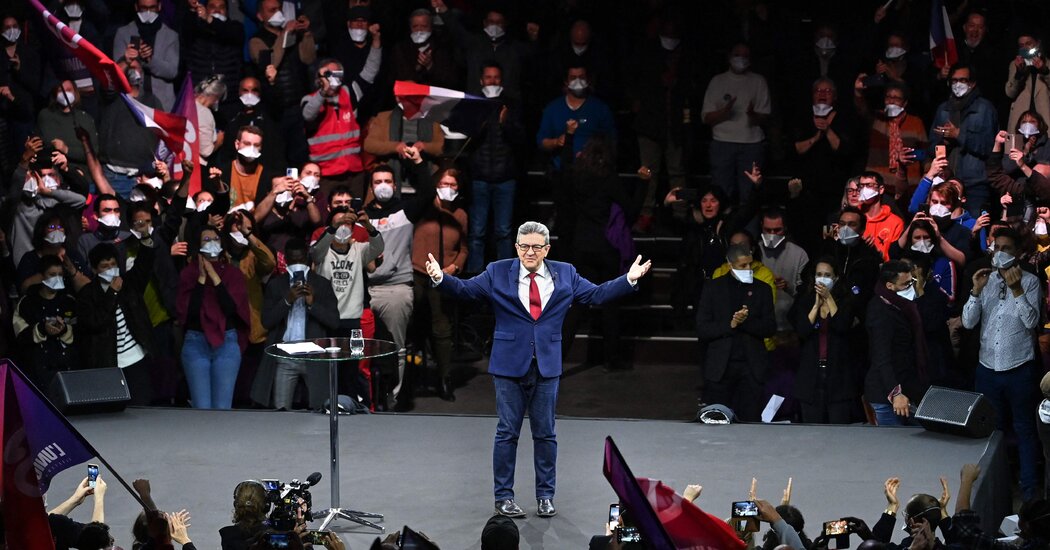By Stéphane Delcros, Left Socialist Party (our sister organisation in Belgium)
Two months after the presidential election, the traditional parties in France received a new blow in the parliamentary elections. It confirms that the political instruments of the bourgeoisie have been undermined after decades of austerity policies.
More than half of the eligible voters simply decided not to take part in the vote. Those who did vote decided not to give an absolute majority to President Macron and elected a historic number of ‘anti-system’ MPs, or candidates seen as such. In the process, Le Pen’s far-right party made a huge breakthrough in parliament.
Rising interest rates and budget deficits will push Macron to make more cuts. He lacks 40 seats to form a majority, so his government will be weak anyway and will have to make agreements with others.
NUPES
While the left party La France Insoumise (FI) had only 17 deputies five years ago, there are now more than 70. Among them Rachel Keke, spokeswoman for the successful 22-month strike by the cleaning staff of the Ibis hotel in Batignolles. They make up about half of the new team of MPs from Nouvelle Union Populaire Ecologique et Sociale (NUPES) with 142 seats, the coalition set up by Mélenchon that unites Parti Communiste Français (PCF), Parti Socialiste (PS) and the Greens (EELV) around FI.
A dynamic campaign was launched, motivated by the possibility of preventing Macron from applying his policies for 5 more years, in particular raising the retirement age to 65 and forcing benefit recipients to do 20 hours of forced labour a week. The — unrealistic — target of a parliamentary majority was not reached, but the momentum prevented Macron from achieving an absolute majority.
It should not be forgotten that a year ago, or even just six months ago, the political debate in France was completely dominated by Macron and the extreme right. This changed at the end of February. The issues of the cost of living and social demands came to the fore, fuelled by inflation and reinforced by the dynamics of Mélenchon’s presidential campaign.
Macron’s policies increase far-right presence in parliament
There has been a violent climate of division in the country for years, complemented by brutal police violence against trade unions and social movements in general, and against young people, especially of immigrant origin. State racism and permanent stigmatisation have increased. Macron and his governments have not failed to stir up discord and to echo the rhetoric of the extreme right.
It is the widespread social despair, created by the neoliberal policies of both traditional right and ‘left’ governments since the 1980s, that fuels the growth of the far right. Claiming to oppose the anti-social elements of Macron’s program, the far-right proposes a false social program that it has no intention of putting into practice.
The “republican front”, the idea of “blocking the far-right”, seems to be over. During the second round, the Macronists have chosen to demonise ‘all extremes’. This was obviously a deliberate strategy, aimed at breaking the momentum and some of the potential of NUPES.
For a programme that really breaks with the system
A number of weaknesses of La France Insoumise have been reinforced after the presidential elections. One of them is the formation of coalitions with the PS and EELV (Greens), something that was already the case at the municipal level. These are coalitions that do not make a real break with traditional politics. This tendency was reinforced in this parliamentary campaign, as these parties were now directly allied with FI in NUPES. The PS and EELV have the goal of co-managing the system and are well aware of this. Their policies contributed to the advancement of the far right in 2002 and 2017.
As for its program, NUPES made demands that largely matched those of FI’s “L’Avenir en commun” program, albeit sometimes slightly watered down. But the NUPES agreement also caused some changes in FI’s attitude. The references to the “pluriform left” (gauche plurielle with the PS, PCF and Greens) under Jospin became milder. Criticism of the 35-hour week measures under Jospin gave way to praise. This measure was never fully implemented and was accompanied by an increase in flexibility.
The FI and NUPES programmes contain some very good demands. The pension age at 60, the allowance of 1063 euros per month for students, the increase of the minimum wage to 1500 euros, the freezing of the prices of basic needs, ecological planning, the repeal of the labour law “El Khomri” introduced under Hollande, the restoration of the wealth tax, 1 billion euros against violence against women … Unfortunately, this program does not have the ambition to put an end to capitalism. It is necessary to confront the interests of the capitalist class. This needs changes such as the nationalisation of the financial and energy sectors, among others, to allow for real price controls and to finance ecological planning.
Today, the enormous weakness of the political instruments of the capitalist class can give the working class confidence to take up the struggle. NUPES must use its parliamentary platform and visibility in the media as a supporting force for the working class struggle, to fight back against any attack the government might try to make. This would facilitate the permanent vigilance from below against the inevitable betrayal of the less anti-neoliberal elements within NUPES.
Chile, Colombia … What programme and what prospects for left-wing governments?
The Mélenchon campaign and the NUPES agreement brought the discussion about the possibility of a left-wing government back to the foreground. This discussion is also present elsewhere, especially in Latin America. In Chile, Gabriel Boric was elected in December 2021. In Colombia, Gustavo Petro won the presidential elections in May-June this year.
The left must adopt an offensive program that is capable of pursuing a policy that does not seek agreement with big business and its profit interests, but that is entirely on the side of the working class. The ruling class will inevitably react to this in order to defend its own interests. We must prepare for this and learn from past experience.
In 1981, François Mitterrand was elected President of France on the basis of a left-wing program and a wave of support from the working class. The first measures, such as the nationalisation of banks and key companies, caused an immediate reaction by the ruling elite with a flight of capital. Mitterrand had no plan to respond, capitulated and made the “tournant de la rigueur” (austerity turn) with neoliberal measures.
In 2015, Alexis Tsipras became prime minister of a left-wing government in Greece after months of general strikes and the rise of his left-wing party SYRIZA. Once in power, Tsipras underestimated the resistance of the bosses and international financial institutions. After six months of government and a referendum in which the workers voted against the cuts, Tsipras capitulated. The example of the SYRIZA government shows how the camp of capital prefers running the risk of economic disaster rather than allowing the left to start implementing a policy that breaks with austerity.
A tiger never becomes a vegetarian
The opposing camp, based on the economic infrastructure of capitalist society, will unleash all its devils including, among other things, the economic weapons of capital flight, lockouts and threats of delocalisation. Any attempt to evade confrontation with the system and avoid replacing it with another system on the basis of a revolutionary movement is doomed to lead to disaster. This is also part of what has happened in Venezuela.
A left-wing government must proceed to nationalise the entire banking and financial sector. Other key sectors of the economy (energy, telecoms, steel, petrochemicals, etc.) must also be nationalised in their entirety. Without indemnity or compensation except on the basis of proven need, and under the control and democratic management of the working class and the community. On this basis, a left-wing government will have to plan the economy and ecological transition, impose capital controls, refuse debt repayment and impose a state monopoly on foreign trade.
This will require the building of a relation of forces in society through struggle, including an appeal to active international solidarity. In this way, socialist measures can be implemented and a new system, a democratic socialist society free from capitalist greed, can take shape.











